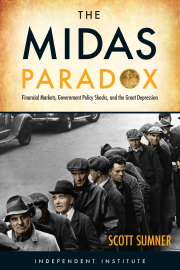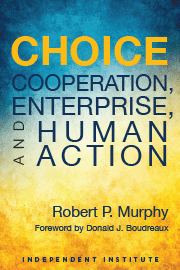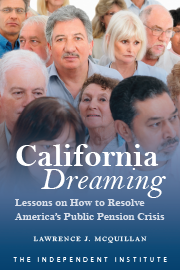Robert Higgs • Monday, March 5, 2018 •
 Q: What are assault weapons?
Q: What are assault weapons?
A: Weapons used in committing assaults.
Q: What are some examples?
A: Knives, clubs, stones, firearms of all types, 105 mm howitzers, B-2 bombers, hands, feet, and teeth.
Q: What’s so bad about these things?
A: Nothing in themselves; everything depends on how they are used. The problem is the assault, not the weapons used in committing it.
Q: Should the government outlaw assault weapons?
A: Are you serious?
***
Robert Higgs is Senior Fellow in Political Economy at the Independent Institute and Editor at Large of The Independent Review. His latest book is Taking A Stand: Reflections on Life, Liberty, and the Economy.
Randall Holcombe • Monday, March 5, 2018 •
 A recent piece in Scientific American by Scott Barry Kaufman concludes that luck plays a far greater role in life success than people realize. Kaufman makes it appear that much of the success of successful people is undeserved, but that conclusion is probably wrong. One reason I’m qualifying my critique is that Kaufman never actually defines success.
A recent piece in Scientific American by Scott Barry Kaufman concludes that luck plays a far greater role in life success than people realize. Kaufman makes it appear that much of the success of successful people is undeserved, but that conclusion is probably wrong. One reason I’m qualifying my critique is that Kaufman never actually defines success.
Kaufman says “luck and opportunity may play a far greater role than we ever realized,” and I’m willing to go part-way to agreeing with that, relying on the slogan that “luck is when preparation meets opportunity.” To a large extent, people make their own luck by being prepared when an opportunity arises. One thing I’ll agree with is that some people have more opportunity than others. The article mentions, for example, that the country a person lives in makes a big difference in the opportunities available to that person.
Raymond March • Wednesday, February 28, 2018 •
 A little over a week ago, I wrote a piece addressing some common misunderstandings and misleading arguments against recent federal right-to-try legislation. Since that short time ago, it seems countless articles expressing more confused ideas and misleading criticisms have made their way into major media outlets.
A little over a week ago, I wrote a piece addressing some common misunderstandings and misleading arguments against recent federal right-to-try legislation. Since that short time ago, it seems countless articles expressing more confused ideas and misleading criticisms have made their way into major media outlets.
The legislation they are attacking is Senate Bill 204. The bill would enable terminally ill patients to access experimental drugs without the FDA’s approval. Patients could receive access with the help of their doctor, consent from the drug producer, and approval by their state government approval. If passed, Senate Bill 204 would provide a decentralized method to prolong the lives of the terminally ill.
Since 2001, 38 states have passed right-to-try legislation. Last August, the bill passed in the U.S. Senate with unanimous consent. In the past few months, top political figures, including President Trump and Vice President Pence, have thrown their support behind the bill and called for the House of Representatives to act quickly and pass it. But widespread grassroots and political support now appears at an impasse.
It appears significant changes to the bill are likely if it is to pass through the House. As one article notes, “a change to the wording (or a new bill altogether) is inevitable.” Similarly, FDA Commissioner Scott Gottlieb is pushing for a narrowed definition of “terminally ill.”
Sam Staley • Tuesday, February 27, 2018 •
 Black Panther is sprinting toward the 1 billion dollar mark in revenues after just two weekends, and its box-office success is well-earned. As a film, Black Panther is excellent in most elements, from its casting, to the studio’s investment in a well-rounded story, to the progression of the movie’s characters, to the commitment to high production values. The director and screenwriters more than compensate for the few plot holes through their compelling story, well-crafted action, superb direction and acting, and top-notch visual and digital effects.
Black Panther is sprinting toward the 1 billion dollar mark in revenues after just two weekends, and its box-office success is well-earned. As a film, Black Panther is excellent in most elements, from its casting, to the studio’s investment in a well-rounded story, to the progression of the movie’s characters, to the commitment to high production values. The director and screenwriters more than compensate for the few plot holes through their compelling story, well-crafted action, superb direction and acting, and top-notch visual and digital effects.
The movie’s story is grounded in the Marvel Comics’ universe (complete with a cameo from Marvel founder Stan Lee). Centuries ago, a meteor lands in central Africa, implanting a mysterious metal called vibranium into the mountains and soil. Known as the hardest metal on Earth, humans want to use its properties to build the next biggest bomb to rule the world. In Africa, five tribes fought over control of the vibranium. One warrior ingested it through a heart-shaped plant and became the first Black Panther, imbued with superhuman powers including a heightened agility, extraordinary speed, and a sixth sense for predicting human action. The war comes to an end, and four tribes agree to use vibranium for peaceful purposes to build their civilization in a country called Wakanda. A fifth tribe (the Jabari) refuses to be ruled by the other four, and retreats into the mountains.
Jonathan Bean • Wednesday, February 21, 2018 •

Frederick Douglass, whose bicentennial birthday fell on Valentine’s Day, is one of the great figures in American history, a hero whose legacy is celebrated even by those who might otherwise contest his actual ideas.
Illustrating this truth, the New York Times marked the occasion by publishing a largely negative review of Timothy Sandefur’s new biography, Frederick Douglass: Self-Made Man—a book that depicts the African-American ex-slave and social reformer as a classical liberal who championed individual liberty based upon natural rights, self-reliance, and Rule of Law.
The book reviewer, Yale University historian David W. Blight, criticizes Sandefur and other “conservatives” for “co-opting” Douglass. (Sandefur is a self-described libertarian, but in Blight’s mind, ‘libertarian’ and ‘conservative’ are distinctions without a difference.) In making this complaint, Blight demonstrates his confusion as to the meaning of “the Right” and classical liberalism.
Blight concedes that Douglass was a “radical thinker and a proponent of classic 19th-century political liberalism” who “loved the Declaration of Independence” and “the natural-rights tradition.” On these issues, Blight’s view is consistent with Sandefur’s libertarian interpretation of Douglass.
Randall Holcombe • Tuesday, February 20, 2018 •
 Since the tragic school shooting in Florida (my home state) last week, I’ve read countless articles arguing that now is the time to enact commonsense firearm regulation. At the same time, those who argue for increased regulation do not suggest any specific regulations. My response is: Give me an example of a commonsense firearm regulation that will actually reduce the illegal use of firearms.
Since the tragic school shooting in Florida (my home state) last week, I’ve read countless articles arguing that now is the time to enact commonsense firearm regulation. At the same time, those who argue for increased regulation do not suggest any specific regulations. My response is: Give me an example of a commonsense firearm regulation that will actually reduce the illegal use of firearms.
It’s easy at a time like this to appeal to emotions and say we have to do something to stop these shootings. It is more difficult to suggest regulatory changes that will actually reduce those shootings. Most suggestions would just impose costs on those who own and use firearms responsibly, for recreation, for hunting, and for their own protection.
I’m well aware that many of those who are calling for more stringent regulation are happy to impose costs on those who own and use firearms responsibly, and I would be too, but only if the more stringent regulations would really reduce criminal shootings.
One suggestion I’ve seen from time to time is to substantially increase taxes on the purchase of firearms and ammunition. Does anyone really think a mass shooter will be deterred by the high price of ammunition? This is the type of suggestion that would only impose costs on responsible users, but have no effect on criminals.
Raymond March • Thursday, February 15, 2018 •
 In a recent press release, Congressman Jason Lewis (R-MN) urged the House of Representatives to pass recent ‘right-to-try’ legislation “as soon as possible.” Lewis also said, “I want each and every treatment option that could save a life to be available to those who are sick” and that “Families are depending on us.”
In a recent press release, Congressman Jason Lewis (R-MN) urged the House of Representatives to pass recent ‘right-to-try’ legislation “as soon as possible.” Lewis also said, “I want each and every treatment option that could save a life to be available to those who are sick” and that “Families are depending on us.”
President Trump and Vice President Pence echoed similar sentiments. In his State of the Union Address, President Trump stated, “It is time for the Congress to give these wonderful Americans the ‘right to try.’ ” About three weeks ago, Vice President Pence tweeted, “Let’s get this [right-to-try] DONE.”
Long before these calls to action, right-to-try laws had gained widespread popularity and acceptance at the state level. Since 2001, 38 states passed right-to-try legislation. In early 2017, a STAT article described right-to-try “becoming law of the land.”
Whether “law of the land” or not, current legislation is a clear step in this direction.
Senate Bill 204, would allow terminally ill patients to receive experimental drug access without the FDA’s approval. Instead, the patient would only need permission from their physician, the drug provider, and their state government.
Robert Higgs • Tuesday, February 13, 2018 •
 Many libertarians have embraced the slogan “taxation is theft.” I myself think it is more precise to say that taxation is extortion. But even saying that fails to capture how egregious taxation really is, especially income taxation.
Many libertarians have embraced the slogan “taxation is theft.” I myself think it is more precise to say that taxation is extortion. But even saying that fails to capture how egregious taxation really is, especially income taxation.
When a mugger or a home invader accosts you, he points a gun at you or waves a knife in your face and demands your wallet or some other property. In most cases, if you surrender your property to him as he demands, he takes it and flees, and you will most likely never see him again. He is, in the classic phrase, the roving bandit.
In contrast, the state is, in Mancur Olson’s classic term, the stationary bandit. It extorts your money constantly, ceaselessly, and no amount of plunder sates its appetite for what rightfully belongs to you. You are milked endlessly by people who have no rightful claim to loot you, but do have the power to take even more of your wealth in the form of interest or penalties or to place you in a steel cage if you make too much of a fuss about being looted.
Alvaro Vargas Llosa • Monday, February 12, 2018 •
 The Dow Jones Industrial Average, the index that tracks a composite of stock prices of 30 major U.S. corporations, recently experienced drops of 2.5 percent, 4.6 percent and 4.1 percent in less than a week. There are partial explanations for this. But if the best investors in history, including Warren Buffett, discourage reducing stock market movements to rational explanations and prefer instead to see them as reflections of the capricious human psychology, it is probably a good idea for most of us to shy away from seeking perfect answers. Otherwise we might be tempted to support public policies aimed at superficially sustaining the stock market bonanza.
The Dow Jones Industrial Average, the index that tracks a composite of stock prices of 30 major U.S. corporations, recently experienced drops of 2.5 percent, 4.6 percent and 4.1 percent in less than a week. There are partial explanations for this. But if the best investors in history, including Warren Buffett, discourage reducing stock market movements to rational explanations and prefer instead to see them as reflections of the capricious human psychology, it is probably a good idea for most of us to shy away from seeking perfect answers. Otherwise we might be tempted to support public policies aimed at superficially sustaining the stock market bonanza.
Here are some partial explanations for the recent declines. One is the gross overvaluation of the stock market, which has been divorced from the real performance of companies for a while. Just before the recent stock market plunges, the CAPE ratio, which measures the relationship between stock prices and the average earnings of the last decade, was at a level higher than on the eve of the Wall Street crash of 1929. Also, the ratio between the total stock market value and the size of the U.S. economy, which tends to be similar when equities are not overvalued, had entered the high-risk zone: the total market capitalization was 40 percent above GDP.
Raymond March • Wednesday, February 7, 2018 •
 A recent a WIRED article followed Arlyn Anderson, who was struggling to find care for her aging father Jim. At 91 years old with Alzheimer’s, Jim was no longer able to care for himself but still wanted to maintain his independence. When Arlyn urged him to consider relocating to a nursing home, Jim refused. Arlyn wanted to respect her father’s wishes, but between a 40 minute drive to check on him and Jim’s quickly deteriorating health, something had to change.
A recent a WIRED article followed Arlyn Anderson, who was struggling to find care for her aging father Jim. At 91 years old with Alzheimer’s, Jim was no longer able to care for himself but still wanted to maintain his independence. When Arlyn urged him to consider relocating to a nursing home, Jim refused. Arlyn wanted to respect her father’s wishes, but between a 40 minute drive to check on him and Jim’s quickly deteriorating health, something had to change.
Situations like these are common. According to the Pew Research Center, in 2017 about 19 percent of households were composed of at least two adult generations. Further, between 2010 and 2030, the percent of the population at least 80 years old is expected to increase 79 percent while the number of family caregivers is only expected to rise one percent.
 Q: What are assault weapons?
Q: What are assault weapons?























 A recent
A recent  A little over a week ago, I wrote a
A little over a week ago, I wrote a  Black Panther
Black Panther
 Since the tragic school shooting in Florida (my home state) last week, I’ve read countless articles arguing that now is the time to enact commonsense firearm regulation. At the same time, those who argue for increased regulation do not suggest any specific regulations. My response is: Give me an example of a commonsense firearm regulation that will actually reduce the illegal use of firearms.
Since the tragic school shooting in Florida (my home state) last week, I’ve read countless articles arguing that now is the time to enact commonsense firearm regulation. At the same time, those who argue for increased regulation do not suggest any specific regulations. My response is: Give me an example of a commonsense firearm regulation that will actually reduce the illegal use of firearms. In a recent
In a recent  Many libertarians have embraced the slogan “taxation is theft.” I myself think it is more precise to say that taxation is extortion. But even saying that fails to capture how egregious taxation really is, especially income taxation.
Many libertarians have embraced the slogan “taxation is theft.” I myself think it is more precise to say that taxation is extortion. But even saying that fails to capture how egregious taxation really is, especially income taxation. The Dow Jones Industrial Average, the index that tracks a composite of stock prices of 30 major U.S. corporations, recently
The Dow Jones Industrial Average, the index that tracks a composite of stock prices of 30 major U.S. corporations, recently  A recent a
A recent a